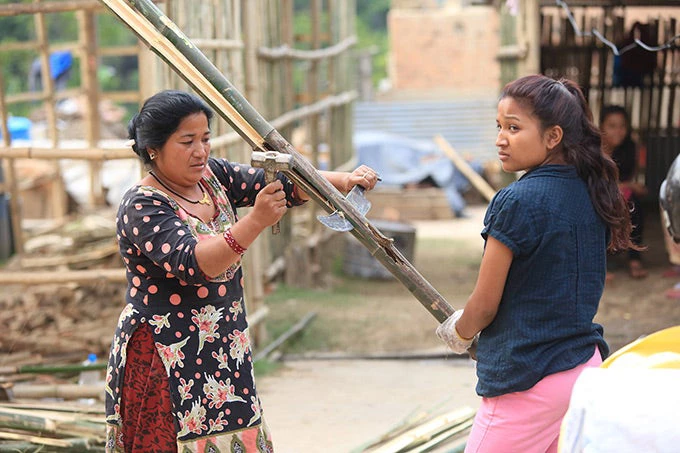
It has been 50 days since the devastating earthquake struck Nepal on April 25. With another powerful aftershock on May 12, a combined 9,000 lives were lost, making this the worst disaster in Nepal’s history in terms of human casualties. One in three Nepali has been affected by the earthquakes. One in ten has been rendered homeless. Half a million households have lost their livelihoods, mostly poor, subsistence farmers. Everyone has been affected in one way or the other – women, men, children, the elderly, the differently-abled. A large part of the country is in ruins.
Nepal is grateful to her friends in the international community for the rapid humanitarian response in the immediate aftermath of the disaster. We owe you our deep respect for your generosity and heroism.
Early estimates from our Post Disaster Needs Assessment (PDNA) price the damages and economic losses at US$ 7 billion, roughly one-third of our economy. The economic growth rate this fiscal year ending mid-July is expected to be the lowest in eight years, at 3.04 percent. Revenue collections will be off-target by at least 8 percent and result in a lower base going into the next FY. The immediate priority is to restore the productive means of livelihood for millions of people in agriculture, services and industry.
Before the earthquake Nepal had been making good progress towards a higher growth trajectory. We were working on a new generation of economic reforms, enacting and revising a raft of policies, laws and regulations. We were also well on our way to achieving the remaining Millennium Development Goals by the end of this year. Nepal also met the required criteria for graduation from Least Developed Country (LDC) by 2022. The disaster has dealt a severe blow to our aspirations.
The disaster has impacted the poor disproportionately. Preliminary estimates suggest that that an additional 3 percent of the population has been pushed into poverty as a direct result of the earthquakes. This translates into at least 700,000 people. To date, the Government of Nepal has announced nearly US$ 1.3 billion in immediate to medium-term cash assistance to those most impacted by the disaster to help rebuild their lives.

Painful as it was, the 2015 earthquake is not the first and last disaster Nepal will face. According to the Natural Disasters Hotspots Report, Nepal is ranked as the 11th most vulnerable country in the world to earthquakes and 30th to flood risks. Combining these hazards, and the high level of vulnerability to both, the country is ranked second in the world for mortality risk from two or more hazards. Nearly 80 percent of our geographic area is at risk from multiple natural hazards, with the vast majority of our population inhabiting these high-risk areas. The recent earthquake sequence was a wake-up call to all of us.
On June 25, the Government of Nepal will host an international conference in Kathmandu on Nepal’s reconstruction. We have invited over 60 development partners and many have confirmed their participation. The PDNA will inform the conference discussions, particularly on the scale of the devastation and the magnitude of our needs to recover. More importantly, the conference will help us articulate a widely owned vision for reconstruction and strategies to plan and prepare better for risks, hazards and vulnerability.
Nepal has managed her economic fundamentals prudently for many years now. We were fortunate in that our fiscal space and balance of payments were both comfortable when the disaster struck. But, going forward, our reconstruction needs are huge and we cannot finance it alone. Moreover, we will need to ensure that development needs in less affected parts of the country continue to be met and that our previous gains are well protected.
Hosting a conference and presenting our needs do not automatically translate in generous pledges of support. As Finance Minister I have no illusions about this. We expect our friends and partners to ask us many questions, including some difficult ones. That’s what good friends do. After all, our development partners, too, have competing priorities at home and abroad and must account to tax-payers in their constituencies. Nonetheless, the conference will be a good platform to discuss our plans and to reassure our partners that external assistance will be put to the best possible use.
As mentioned earlier, many reforms, including those relating to public financial management, were already in the works before the earthquake struck and we will now expedite these. Extraordinary measures will be instituted to deal with extraordinary circumstances. But in doing so we will not be looking to cut corners on fiduciary, environmental and social safeguards. That would only harm our own development interests. Rather, we will look for ways to embolden the public service to take informed risks and streamline cumbersome processes so that decisions, fund-flows, actions and results occur in a timely and accountable manner.
Regarding the institutional set-up for implementing reconstruction programs, we are considering several proposals based on global experiences and potential innovations suited to our local context. We are open to ideas. Our intention is to keep the structure light, empower line agencies, attract the best and the brightest professionals domestically and from the diaspora, create synergies and coordinate activities through a central agency vested with special powers. Checks and balances will be part and parcel of the institutional arrangements. The architecture for fund flows is being redesigned for simplicity and transparency. Laws and regulations are currently under review for these purposes.
I am deeply aware about the critique surrounding the government’s “One Window” policy for reconstruction assistance. I believe the current debate is misinformed and the skepticism is unfounded. There is a lot of goodwill for Nepal among global charities, foundations, NGOs, philanthropists and private citizens. It is in our interest to tap into this groundswell of solidarity. That said, any responsible government will try to ensure that the delivery of aid is inclusive and equitable. The last thing we want is for poorly-targeted assistance to exacerbate conflict. The purpose of the One Window is not to control or direct assistance but to ensure that aid reaches the neediest in a socially cohesive manner. We are working on a policy that will clarify roles and responsibilities and take into account public, private and civic aspirations to engage in the reconstruction effort.
Our reconstruction programs will be socially accountable. They will be designed to encourage community participation and involve third-party monitoring, as well as certification, for instance in the case of rebuilding new homes to resilient standards. These programs will utilize the best of Nepal’s experience in citizens’ voice, transparency and grievance handling at the local level. At the central level, oversight will be provided by constitutionally mandated bodies such as Parliamentary Committees, the Commission for the Investigation of Abuse of Authority (the anti-corruption agency) and the Office of the Auditor General. Nepal’s vibrant media and the constitutionally guaranteed citizen’s Right to Information will complement these efforts.
Finally, our reconstruction efforts will be designed to work with the market – not against it – to restore local economies, jobs and livelihoods at the earliest. Integrated approaches and innovative partnerships with the private sector will be key in this regard.
The disaster has united us in the face of adversity. Last week the main political parties in Nepal shed their longstanding differences to overcome an eight year deadlock in reaching agreement on the fundamentals of a new constitution that promises to conclude our protracted transition to peace and stability. This has been greeted with widespread optimism and hope. Now is the time to build anew. Working together with the international community, I believe we are well poised to collectively take on the challenge.


Join the Conversation